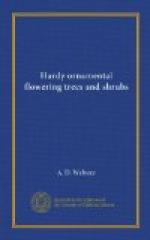ARBUTUS ANDRACHNE.—Levant, 1724. This Mediterranean species is of stout growth, with narrow Laurel-like leaves, reddish deciduous bark, and greenish-white flowers that are produced freely in May. A hybrid form, said to have originated between this species and A. Unedo, partakes in part of the nature of both shrubs, but the flowers are larger than those of A. Unedo.
A. MENZIESII (syn A. procera).—Tall Strawberry Tree. North-west America, 1827. This is hardy in many parts of these islands, particularly maritime districts, and is worthy of culture if only for the large racemose panicles of deliciously-scented white flowers, and peculiar metallic-green leaves. The fruit is orange-red, and only about half the size of those of our commonly cultivated species.
A. UNEDO.—Strawberry Tree. Ireland. This is a beautiful evergreen shrub or small-growing tree, sometimes fully 20 feet high, with ovate-lanceolate leaves, and clusters of pure white or yellowish-tinged flowers appearing in September and October. The bright scarlet fruit, about the size of and resembling a Strawberry, is highly ornamental, and when borne in quantity imparts to the plant an unusual and very attractive appearance. Generally speaking, the Arbutus is hardy, although in inland situations it is sometimes killed to the ground in severe winters, but, springing freely from the root, the plant soon becomes re-established. In a young state it suffers too, but after becoming established and a few feet high, the chances of injury are greatly minimised. Three well-marked varieties are A. Unedo coccinea and A. Unedo rubra, bearing scarlet and deep-red flowers, and A. Unedo microphylla, with much smaller leaves than those of the parent plant.
A. UNEDO CROOMEI differs considerably from the former, in having larger foliage, larger clusters of reddish-pink flowers, and the bark of the young shoots of an enticing ruddy, or rather brownish-red colour. It is a very desirable and highly ornamental plant, and one that is well worthy of extended culture.
There are several others, to wit A. photiniaefolia, A. Rollissoni, A. Millerii, with large leaves, and pretty pink flowers, and A. serratifolia, having deeply serrated leaves. Deep, light loam, if on chalk all the better, and a fairly warm and sheltered situation, would seem to suit the Arbutus best.
ARCTOSTAPHYLOS.
ARCTOSTAPHYLOS UVA-URSI.—Bearberry. Britain. A neat shrub of trailing habit, and with flowers resembling those of the Arbutus, but much smaller. The leaves are entire, dark green in colour, and about an inch long, and obovate or oblong in shape. Fruit globular, of a bright red, smooth and shining. This is a native shrub, being found in Scotland, northern England and Ireland.
A. ALPINA.—Black Bearberry. Scotland. This is confined to the northern Highlands of Scotland, is of smaller growth, with toothed deciduous leaves, and small drooping flowers of two or three together.




